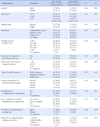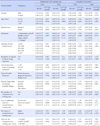Abstract
Purpose
The purpose of this study was to compare hospitalized patients in comprehensive nursing care units and general care units as to satisfaction with nursing care and factors influencing their intent to revisit the hospital
Methods
A cross-sectional study was conducted with 178 patients who had been hospitalized in a comprehensive nursing care unit and a general care unit in one hospital. Participants completed self-report questionnaires. Data were analyzed using SPSS 21.0.
Results
There was a significant difference between the comprehensive nursing care unit and general care unit for intent to revisit the hospital (p=.036). Factors influencing intent to revisit the hospital for patients in the comprehensive nursing care unit were 'satisfaction with nursing care' (p<.001) and 'use of additional costs for comprehensive nursing care' (p=.041). The factor influencing intent to revisit hospital for patients in the general care unit was 'satisfaction with nursing care' (p<.001).
Conclusion
Findings indicate that comprehensive nursing care service in which all care is provided by nursing staff only, without family or private caregivers, increases intent to revisit the hospital. These results can be used as the foundation of reviewing the operation and expansion of comprehensive nursing care service.
Figures and Tables
Table 1
Homogeneity of Participants' Characteristics for Hospitalized Patients in a Comprehensive Nursing Care Unit and a General Nursing Care Unit (N=178)

Table 2
Comparison of Satisfaction with Nursing Care and Intent to Revisit Hospital for Patients Hospitalized in Comprehensive Nursing Care Unit and General Nursing Care Unit (N=178)

Table 3
Differences in Satisfaction with Nursing Care and Intent to Revisit Hospital by Participant Characteristics for Hospitalized Patients in a Comprehensive Nursing Care Unit and General Nursing Care Unit (N=178)

References
1. Hwang NM. An analysis of the debates on introduction of public caregivers' services in acute medical centers. Health Welf Policy Forum. 2010; 170:60–71.
2. Kwag WH. Contents and problems of pilot project on comprehensive nursing care service [Internet]. Seoul: Research Institute for Healthcare Policy;2015. cited 2015 September 11. Available from: http://webzine.rihp.re.kr/webzine_201506/a_05_02.html.
3. National Health Insurance Service. Guideline of pilot project on comprehensive nursing care service [Internet]. Seoul: National Health Insurance Service;2015. cited 2015 September 13. Available from: http://www.nhis.or.kr/bbs7/boards/B0040/14050.
4. Oetker-Black S, Petrochuk M. A descriptive analysis of nursing satisfaction: First-time versus non-first-time medical-surgical patients. Health Mark Q. 2012; 29(4):303–310. DOI: 10.1080/07359683.2012.732851.
5. Park YH, Jun JK, Hong JB. The influence of geriatric hospital service quality and customer satisfaction on repurchase intention. J Korean Data Anal Soc. 2009; 11(4):1871–1881.
6. Lee MA, Gong SW, Cho SJ. Relationship among nursing service quality, medical service satisfaction, and hospital revisit intent. J Korean Acad Nur Adm. 2012; 18(1):96–105. DOI: 10.11111/jkana.2012.18.1.96.
7. Yang JH, Song TK, Chang DM. Effects of medical service quality on the customer satisfaction and intention of revisit in cancer patients. J Korea Contents Assoc. 2012; 12(12):269–281. DOI: 10.5392/JKCA.2012.12.12.269.
8. Lee MA, Yom Y. A comparative study of patients' and nurses' perceptions of the quality of nursing services, satisfaction and intent to revisit the hospital: A questionnaire survey. Int J Nurs Stud. 2007; 44(4):545–555. DOI: 10.1016/j.ijnurstu.2006.03.006.
9. Atkins PM, Marshall BS, Javalgi RG. Happy employees lead to loyal patients. Survey of nurses and patients shows a strong link between employee satisfaction and patient loyalty. J Health Care Mark. 1996; 16(4):14–23.
10. Urden LD. Patient satisfaction measurement: current issues and implications. Outcomes Manag. 2002; 6(3):125–131.
11. Choi JH, Kim JA, Hong NS, Lee BH, Lee EH. The effects of preparatory nursing information and information offered by short message service on anxiety and nursing satisfaction among family members of the intensive care unit in-patients. J Korean Clin Nurs Res. 2013; 19(3):383–394.
12. Lim YH, Suh IS, Chung SH. Effects of surgery information service on one-day surgery patients' anxiety and satisfaction with nursing care. Korean J Adult Nurs. 2010; 22(1):1–10.
13. Park YS, Han KJ, Ha YS, Song MS, Kim SJ, Chung CW, et al. Effects of telephone counseling on health and service satisfaction after discharge in gynecologic cancer women. J Korean Acad Soc Nurs Educ. 2008; 14(2):294–304.
14. Yeun YR. Effects of comprehensive nursing service on the nursing performance, job satisfaction and customer orientation among nurses. J Korea Acad Ind Coop Soc. 2015; 16(1):317–323. DOI: 10.5762/KAIS.2015.16.1.317.
15. Lee HJ, Chai CG. A study on the use and circulation of comprehensive care ward in S public hospital. J Korea Inst Healthc Archit. 2015; 21(1):27–36. DOI: 10.15682/jkiha.2015.21.1.27.
16. Wandelt MA, Ager JW. Guideline and instructions for observation/ ratings. In : Wandelt MA, Ager JW, editors. Quality patient care scale. New York: Appleton-Century-Crofts;1974. p. 34–50. .
17. Park KO. A study of variables related to nursing productivity. J Nurs Acad Soc. 1994; 24(4):584–596.
18. Parasuraman A, Zeithaml VA, Berry LL. Reassessment of expectation as a comparison standard in measuring service quality: Implications for future research. J Mark. 1994; 58:111–124.
19. Paik SK. The international marketing strategy for the performance of medical service [dissertation]. Seoul: Sunkyunkwan University;2001.
20. Lee MA. A comparative study of how subjects' characteristics and nursing service quality influence on hospital revisiting intent between patients and nurses. J Korean Acad Nurs. 2005; 35(7):1210–1220.
21. Lee MA. A study of the nursing service quality and satisfaction that admitted patients perceived - being used SERVQUAL -. J Korean Acad Nurs. 2002; 32(4):506–518.
22. Kim JH, Lee IS. The differences in quality perceptions, expectations, evaluation, and satisfaction for nursing service between patients and nurses: Small-medium sized general hospitals. J Korean Acad Nurs. 2004; 34(7):1243–1254.
23. Choi HJ. Comparative study between the patients' satisfaction level of nursing service and revisit intention of the inpatients according to the ward type [master's thesis]. Seoul: Sahmyook University;2014. 33.
24. Lim DG, Jaegal D. A study on factors in selecting hospital of the elderly in Andong. Soc Sci Res Rev. 2011; 27(3):121–139.
25. Kwak CY, Kim SJ, Kang KA, Yim ES. A study on the status and problems of formal caregiving system by hospitals in South Korea. J Korean Data Anal Soc. 2013; 15(2B):827–839.
26. Shin DS, Sung MS, Park SY, Ham OK. Nurses' perception on the performance and management of paid caregivers in acute hospitals. J Korean Data Anal Soc. 2012; 14(1B):247–258.
27. Kim BY, Jeong MA. The effects of medical service qualities on satisfaction, relationship quality, and revisit intent in long term care hospital an elderly out-patients. Health Policy Manag. 2012; 22(2):183–206. DOI: 10.4332/KJHPA.2012.22.2.183.




 PDF
PDF ePub
ePub Citation
Citation Print
Print




 XML Download
XML Download